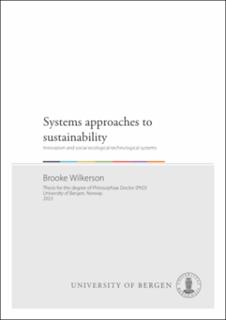Systems approaches to sustainability : Innovation and social-ecological-technological systems
Doctoral thesis
Permanent lenke
https://hdl.handle.net/11250/3106968Utgivelsesdato
2023-12-19Metadata
Vis full innførselSamlinger
- Department of Geography [627]
Sammendrag
Bærekraft integreres i økende grad i innovasjons- og planleggingsprosesser, men begrepet blir ofte ufullstendig eller implisitt konseptualisert og operasjonalisert. Operasjonalisering av bærekraft krever vurdering av aksjoner på tvers av dimensjoner som rom, tid, og sektorer. Bærekraft er i seg selv et relasjonelt og systemisk begrep, og forståelse av samspillet mellom individuelle komponenter og systemet som helhet er avgjørende for operasjonalisering av begrepet. Å tilnærme seg bærekraft fra et relasjonelt og dynamisk perspektiv krever evaluering av tilbakekoblinger og endringer over tid. Dette peker på systemmetoder som egnet for å forstå og operasjonalisere begrepet.
Denne avhandlingen tar opp det overordnede forskningsspørsmålet: Hvordan kan systemtilnærminger bidra til å forstå og informere overganger mot bærekraft? Innenfor denne rammen blir bærekraft konseptualisert og operasjonalisert på flere måter. For det første identifiseres sentrale aspekter ved bærekraft som kan understøtte definisjon av innovasjonsproblemer. For det andre implementeres systemkartleggingsmetoder i bærekraftsorienterte innovasjonsprosesser for å bedre belyse bærekraftsaspekter. For det tredje brukes systemdynamisk modellering og simulering for å forstå implementering av urban politikk, og for å illustrere samspill og synergier mellom ulike grep for håndtering av overvann.
Hovedkonklusjonen i denne avhandlingen er at systemmetoder har potensiale til å forbedre problemdefinisjoner for innovasjons- og planleggingsprosesser, og for å fremme felles læring og forståelse av komplekse bærekraftsproblemer. Spesielt støtter metodene utviklet i denne avhandlingen en mer nyansert og kompleks tenkning om bærekraft som oppfattes som nyttig av ulike typer praktikere. I tillegg kan et systemperspektiv og systemforståelse av urbane politiske innovasjoner bidra til å identifisere potensielle målkonflikter, samt optimalisere implementering. Å definere og operasjonalisere bærekraft er fortsatt en utfordring, men bidrag som å videreutvikler begrepet og dets anvendelse gir likevel verdifull veiledning og retning. Ettersom bærekraftsutfordringene fortsetter å vokse, vil behovet etter slik veiledning bare bli mer presserende. Sustainability is increasingly integrated into innovation and planning processes, yet the term is often incompletely or implicitly conceptualized and operationalized in those contexts. Operationalizing sustainability requires consideration of actions across sectors and across spatial and temporal dimensions. Sustainability is also inherently relational and systemic, and understanding interactions between individual components and the system as a whole is key to operationalizing the term. Approaching sustainability from a relational and dynamic perspective demands consideration of feedback and change over time. This points to the suitability of systems methods for understanding and operationalizing this term.
This thesis addresses the broad research question: How can systems approaches help understand and inform transitions towards sustainability? Within this scope, sustainability is conceptualized and operationalized in several ways. First, key facets of sustainability are identified that can support definition of innovation problems. Second, systems mapping methods are implemented in sustainability-oriented innovation processes to better highlight sustainability aspects. Third, system dynamics modeling is applied to an urban policy implementation case to illustrate interactions and synergies between stormwater management policies.
The primary conclusion of this thesis is that system methods have the potential to improve problem definitions for innovation and planning processes and to foster shared learning about complex sustainability issues. In particular, the methods developed in this thesis support more nuanced and complex thinking about sustainability and are perceived as useful by various types of practitioners. In addition, understanding urban policy innovations from a systems perspective can help identify potential goal conflicts and help optimize implementation. Though defining and operationalizing sustainability remains a challenge, efforts to further develop the concept and its application can still provide valuable guidance. As sustainability challenges continue to grow, the demand for such guidance will only become more urgent.
Består av
Paper 0. Wilkerson, B., A. Aguiar, C. Gkini, I. Czermainski de Oliveira, L.-K. Lunde Trellevik, and B. Kopainsky. 2020. Reflections on adapting group model building scripts into online workshops. System Dynamics Review 36:358- 372. The article is available at: https://hdl.handle.net/11250/2753304Paper 1. Wilkerson, B., In review. Advancing sustainability-oriented innovation practice with quality criteria for problem definitions. Heliyon. Not available in BORA.
Paper 2. Wilkerson, B., and L.-K. L. Trellevik. 2021. Sustainability-oriented innovation: Improving problem definition through combined design thinking and systems mapping approaches. Thinking Skills and Creativity, 42, 100932. The article is available at: https://hdl.handle.net/11250/2833546
Paper 3. Wilkerson, B., E. Romanenko, and D. N. Barton. 2022. Modeling reverse auction-based subsidies and stormwater fee policies for Low Impact Development (LID) adoption: a system dynamics analysis. Sustainable Cities and Society, 79, 103602. The article is available at: https://hdl.handle.net/11250/2976833

